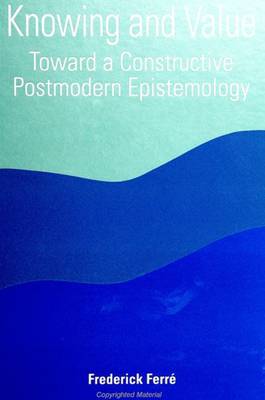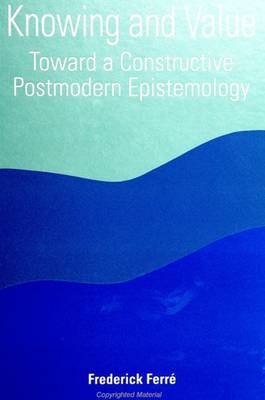
- Retrait gratuit dans votre magasin Club
- 7.000.000 titres dans notre catalogue
- Payer en toute sécurité
- Toujours un magasin près de chez vous
- Retrait gratuit dans votre magasin Club
- 7.000.0000 titres dans notre catalogue
- Payer en toute sécurité
- Toujours un magasin près de chez vous
Description
Offers a postmodern theory of knowledge based on an ecological worldview that stresses real relations and the pervasiveness of values.
Modern thought, finally free from premodern excesses of belief, immediately fell prey to excesses of doubt. This book points toward a postmodern approach to knowing that moves beyond the tired choice between dogma and skepticism. Its key deconstructive aim is to help contemporary philosophers see that their paralyzing modern "epistemological gap" is a myth. Its positive outcome, however, reverses the identification of "postmodern" with deconstruction rather than construction, with the "end of philosophy" rather than renewal in philosophy.
Knowing and Value begins by tracing how we got here, and argues that much of our modern dilemma rests on choices that might have gone otherwise. Key value judgments underlying Plato's and Aristotle's epistemological norms, which still tend to govern our theories of knowledge, are clarified. Next the value-laden sources of premodern attitudes toward knowing are exposed by showing how the Christian synthesis of faith and reason was at first built by medieval Platonists and Aristotelians, then razed by premodern nominalists. This diagnostic account concludes with a close look at how modernity, from Hobbes and Descartes to Kant, designed its own epistemological trap by rejecting some premodern values, while accepting others.
The book also examines the principal ways moderns (positivists, idealists, existentialists, and pragmatists) have tried to cope with the supposed epistemological gap-each without success, but with every failure leaving resources for rebuilding.
In a constructive climax, the book shows how an ecological worldview, emphasizing real relations (the view proposed in its predecessor volume, Being and Value) can heal the needless ruptures on which modern epistemic maladies depend. A reformed account of human experience confronts modern skepticism head-on; a fresh "process" approach to language and thinking is proposed; and finally, a postmodern, pluralist view of theories and truth is offered under a guiding aesthetic metaphor: "Knowing is the music of thought."
Spécifications
Parties prenantes
- Auteur(s) :
- Editeur:
Contenu
- Nombre de pages :
- 393
- Langue:
- Anglais
- Collection :
Caractéristiques
- EAN:
- 9780791439906
- Date de parution :
- 07-10-98
- Format:
- Livre broché
- Format numérique:
- Trade paperback (VS)
- Dimensions :
- 149 mm x 225 mm
- Poids :
- 517 g

Les avis
Nous publions uniquement les avis qui respectent les conditions requises. Consultez nos conditions pour les avis.






